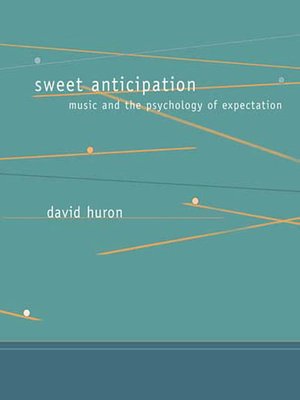
Sign up to save your library
With an OverDrive account, you can save your favorite libraries for at-a-glance information about availability. Find out more about OverDrive accounts.
Find this title in Libby, the library reading app by OverDrive.



Search for a digital library with this title
Title found at these libraries:
| Library Name | Distance |
|---|---|
| Loading... |
How does music evoke awe or spine-tingling chills? This pioneering study draws on cognitive science, evolutionary psychology, and music theory to understand the link between expectation and our emotions.
“A fascinating journey into the inner workings of music and how it tickles the human mind.” —Nature
The psychological theory of expectation that David Huron proposes in Sweet Anticipation grew out of his experimental efforts to understand how music evokes emotions. These efforts evolved into a general theory of expectation that will prove informative to readers interested in cognitive science and evolutionary psychology as well as those interested in music. The book describes a set of psychological mechanisms and illustrates how these mechanisms work in the case of music.
Huron proposes that emotions evoked by expectation involve 5 functionally distinct response systems:
• Reaction responses, which engage defensive reflexes
• Tension responses, where uncertainty leads to stress
• Prediction responses, which reward accurate prediction
• Imagination responses, which facilitate deferred gratification
• Appraisal responses, which occur after conscious thought is engaged
For real-world events, these 5 response systems typically produce a complex mixture of feelings. The book identifies some of the aesthetic possibilities afforded by expectation, and shows how common musical devices (such as syncopation, cadence, meter, tonality, and climax) exploit the psychological opportunities. The theory also provides new insights into the physiological psychology of awe, laughter, and spine-tingling chills. Huron traces the psychology of expectations from the patterns of the physical/cultural world through imperfectly learned heuristics used to predict that world to the phenomenal qualia we experienced as we apprehend the world.
“A fascinating journey into the inner workings of music and how it tickles the human mind.” —Nature
The psychological theory of expectation that David Huron proposes in Sweet Anticipation grew out of his experimental efforts to understand how music evokes emotions. These efforts evolved into a general theory of expectation that will prove informative to readers interested in cognitive science and evolutionary psychology as well as those interested in music. The book describes a set of psychological mechanisms and illustrates how these mechanisms work in the case of music.
Huron proposes that emotions evoked by expectation involve 5 functionally distinct response systems:
• Reaction responses, which engage defensive reflexes
• Tension responses, where uncertainty leads to stress
• Prediction responses, which reward accurate prediction
• Imagination responses, which facilitate deferred gratification
• Appraisal responses, which occur after conscious thought is engaged
For real-world events, these 5 response systems typically produce a complex mixture of feelings. The book identifies some of the aesthetic possibilities afforded by expectation, and shows how common musical devices (such as syncopation, cadence, meter, tonality, and climax) exploit the psychological opportunities. The theory also provides new insights into the physiological psychology of awe, laughter, and spine-tingling chills. Huron traces the psychology of expectations from the patterns of the physical/cultural world through imperfectly learned heuristics used to predict that world to the phenomenal qualia we experienced as we apprehend the world.







